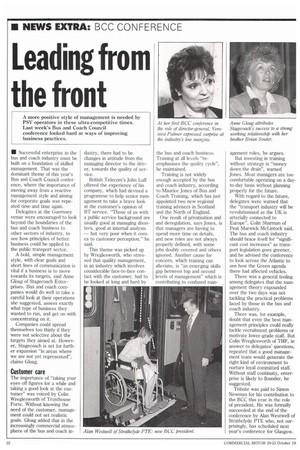Leading from the front
Page 26

If you've noticed an error in this article please click here to report it so we can fix it.
• Successful enterprise in the bus and coach industry must be built on a foundation of skilled management. That was the dominant theme of this year's Bus and Coach Council conference, where the importance of moving away from a reactive management style and aiming for corporate goals was repeated time and time again.
Delegates at the Guernsey venue were encouraged to look beyond the boundaries of the bus and coach business to other sectors of industry, to see how principles of better business could be applied to the public transport sector.
A bold, simple management style, with clear goals and short lines of communication is vital if a business is to move towards its targets, said Anne Gloag of Stagecoach Enterprises. Bus and coach companies would do well to take a careful look at their operations she suggested, assess exactly what type of business they wanted to run, and get on with concentrating on it.
Companies could spread themselves too thinly if they were not selective about the targets they aimed at. However. Stagecoach is set for further expansion "in areas where we are not yet represented", claims Gloag.
Customer care
The importance of "taking your eyes off figures for a while and taking a good look at the customer" was voiced by Colin Wreglesworth of Trusthouse Forte. Without knowing the need of the customer, management could not set realistic goals. Gloag added that in the increasingly commercial atmosphere of the bus and coach in dustry, there had to be changes in attitude from the managing director to the driver, towards the quality of service.
British Telecom's John Luff offered the experience of his company, which had devised a programme to help senior management to take a brave look at the customer's opinion of BT service. "Those of us with a public service background are usually good at managing disasters, good at internal analysis — but very poor when it comes to customer perception," he said.
This theme was picked up by Wreglesworth, who stressed that quality management, in an industry which involves considerable face-to-face contact with the customer, had to be looked at long and hard by the bus and coach business. Training at all levels "reemphasises the quality cycle", he maintained.
Training is not widely enough accepted by the bus and coach industry, according to Maurice Jones of Bus and Coach Training, which has just appointed two new regional training advisers in Scotland and the North of England.
One result of privatisation and and deregulation, says Jones, is that managers are having to spend more time on details, and new roles are not always properly defined, with some jobs doubly covered and others ignored. Another cause for concern, which training can alleviate, is "an emerging skills gap between top and second levels of management" which is contributing to confused man agement roles, he argues.
But investing in training without strategy is "money down the drain", warned Jones. Most managers are too comfortable operating on a dayto-day basis without planning properly for the future.
With regard to the future, delegates were warned that the "transport industry will be revolutionised as the UK is arterially connected to Europe". Colin Sharman of Peat Marwick McLintock said. The bus and coach industry should brace itself for "significant cost increases" as transport legislation goes greener, and he advised the conference to look across the Atlantic to see how the Green agenda there had affected vehicles.
There was a general feeling among delegates that the management theory expounded over the two days was not tackling the practical problems faced by those in the bus and coach industry.
There was, for example, doubt that even the best management principles could really tackle recruitment problems or motivate lower-grade staff. But Colin Wreglesworth of THF, in answer to delegates' questions, repeated that a good management team would generate the right kind of environment to nurture loyal committed staff. Without staff continuity, enterprise is likely to flounder, he suggested.
Tribute was paid to Simon Newman for his contribution to the BCC this year in the role of president. He was formally succeeded at the end of the conference by Alan Westwell of Strathclyde PTE who, not surprisingly, has scheduled next year's conference for Glasgow.






























































































































































